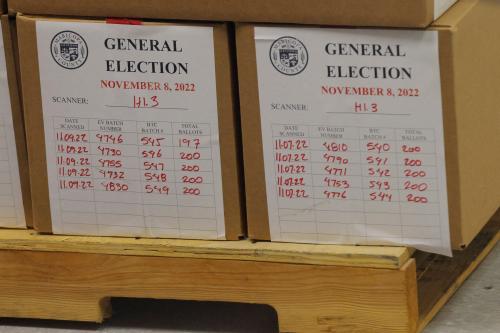Twenty years ago, Rwanda, Burundi and the Democratic Republic of the Congo (DRC) were engulfed by a series of wars that drew in armies from across the continent, froze economic growth, and triggered some of the worst atrocities seen since the Second World War. Genocide in Rwanda, civil war in Burundi, and the wars and state collapse in the DRC have claimed millions of lives and cost billions of dollars in assistance and lost opportunities.
In many parts of the region, the fundamental conflict dynamics remain. The resource-rich eastern Congo remains home to armed groups hostile to neighboring governments, and draws the attention of the Congo’s neighbors. The collapse of state authority and the prevalence of armed groups have led to local self-defense militias and a complex web of informal power structures, which have in turn become a source of instability for their communities and their neighbors.
As 2015 begins, there is a unique opportunity for the region to put the past two decades of regional crisis behind it, create stability and new opportunities for its citizens. But setting the region on a new path will require sustained engagement from regional governments, their historic international partners, and the broader global community to both address the violent conflict in the eastern DRC as well as the underlying political economy of conflict.
Defining the Endgame in the Eastern DRC
At the start of 2015, there is more reason to be hopeful for stabilization in the DRC than ever before. The challenge is how to define the success we are seeking. The agreement of the Peace, Security and Cooperation Framework in 2013 among the regional bodies and national governments there triggered a renewed diplomatic push, including the appointment of high-level special envoys, including former Irish President Mary Robinson as United Nations envoy and former Senator Russ Feingold as the United States Special Envoy. The high-level diplomatic focus in support of the regionally brokered agreement helped overcome years of fragmentation in international engagement in the Great Lakes, and provided a locus for coordination among competing priorities.
Improved diplomatic coordination has been matched by profound changes on the ground in the most sensitive regions, particularly in the provinces of North and South Kivu. The Congolese Army, backed by a new Rapid Intervention Brigade of U.N. troops, has made inroads in these provinces, which have historically been dominated by a patchwork of armed groups. A combination of military and diplomatic pressure ended the M23 rebellion, one of the best-armed rebel groups that threatened Goma, the regional capital. Long-awaited new operations against other remaining rebel groups, including the FDLR (Democratic Forces for the Liberation of Rwanda) and ADF-Nalu, are currently being planned for the first half of 2015.
Addressing the problem of armed groups remains an important first step, but defeat of the rebel groups will not secure peace. The underlying drivers of instability that gave rise to armed groups will remain: conflict over scarce land and resources, existential fear between communities that has been stoked by the lawlessness of the past 20 years, and competition over access to local positions of authority. In a region awash with guns, natural resources, and a desperate population, one major research initiative by Mercy Corps, World Vision and Search for Common Ground observed that there remains a “market for violence.” Thus, military progress against armed groups supplying violence must be matched by progress in reducing the demand for violence. There are three ways that the U.S. and its international partners can support Congolese government and citizens’ efforts to stabilize the region:
- First, the hardest diplomatic and political task will be finding durable solutions to the tens of thousands of displaced people within the region. Disagreements over the return of displaced people are as old as the conflict itself and have been a stumbling block within the implementation of past peace accords, particularly surrounding organized refugee returns between Rwanda and the DRC. Achieving a return or resettlement of displaced people will require intensive coordination between regional governments, humanitarian actors and international partners, accompanied by local-level land dispute resolution and transparency around the return process. Some of these challenges were outlined recently in a Brookings-Bern IDP Project Research Paper.
- Second, there is a need for the U.S. and other international partners to support locally led actions to address intercommunity tensions, fear, and the legacy of war. Militia groups are closely identified with ethnic and regional interests, and can count upon these support bases as long as the issues remain. Locally led conflict resolution initiatives have been successful in stabilizing some of the hardest places in villages throughout the Eastern DRC and can be taken to scale to address the dynamics that have led to recurrent cycles of violence.
- Finally, there will ultimately be a need for donor countries and the Congolese government to tackle security sector reform to reinforce the ability of the Armed Forces and Police to ensure control across its vast territory. Decades of internationally supported military cooperation and policy reforms have yielded decidedly mixed results, and the systemic weaknesses in accountability have persisted. Promising new efforts focus on building the security sector from the bottom up, through initiatives including: community policing, reaching out to civil society and local governments, and working with individual units to change the norms around how their soldiers behave..
Addressing the Political Economy of Conflict
At the national level, attention has rightly focused on the upcoming elections in Burundi, Rwanda and the DRC. The question of presidential succession, term limits and the power of incumbency looms large within each country. As John Mbaku noted in his Brookings Foresight Africa 2015 piece, this is part of a continental wave of potentially transformative elections in 2015 and 2016. Regardless of the outcome, the governments that emerge will face the same constraints of a political economy that has fueled grievances and inequality for decades.
However, like much of Africa, distortions in the region’s political economy that began in the colonial era persisted under decades of authoritarian rule. A lack of access to stable employment within the cash economy has led many to see state capture as the only viable means to secure an economic future. As a result, a political culture of winner-takes-all politics has taken root within the region. The upcoming elections will not provide a silver bullet. Without a transformation in the nature of political competition within each of the three countries—away from zero-sum game among representatives of different identity groups—it will be difficult for any government to change the structural challenges of poverty and desperation. In 2015, there are four measures that the U.S. and its international partners can initiate to help address these issues and support integration into the global economy.
- First, the U.S. and others can engage civil society and media to foster constructive policy dialogue engaging both citizens and government, particularly during the elections period. Civil society and media sectors have historically been fragmented, partisan, and often limited to a watchdog role. New leadership models can reinforce their role in driving policy dialogue and improving communication between states and citizens. In the medium term, educational reform can help prepare for generational change of leaders by reinforcing civic education curricula.
- Second, there is a continued need to reinforce the ethos of accountability in public service, particularly at the local levels. This sort of systematic strengthening is at the core of the peacebuilding and state-building goals laid out in the New Deal for Engagement in Fragile States, agreed in Busan in 2011, and in which both the DRC and Burundi have agreed to participate. Innovative techniques like Tribunes d’Expression Populaires (town hall fora), score cards to rate local service delivery, and participatory budgeting have provided some examples of constructive ways for citizen-state collaboration to improve services.
- Third, the U.S. can play a particularly important role in supporting investment in the region, creating new opportunities for non-farm income. The minerals sector, particularly in the DRC, has been a source of conflict but can also serve as an engine for growth. Global mechanisms linking companies, communities and governments, such as the Voluntary Principles on Security and Human Rights, can provide a framework for cooperation in fragile environments.
- Finally, two decades of tensions have blocked the integration of the region’s economy. The economic development of the DRC, Rwanda and Burundi is deeply interlinked, but there has been little economic cooperation. Initiatives like the Economic Community of the Great Lakes Countries (CEPGL) can guarantee support for a “peace dividend.” Facilitating the movement of people and goods within the region holds the potential for job creation, higher-value agriculture, and skills transfer. Infrastructure projects such as a regional power pool, and improved transportation networks can help bring the region into the global economy while developing local markets.
Note:
Shamil Idriss is the president and chief executive officer of
Search for Common Ground.
Mike Jobbins is the senior program manager for Africa.
SFCG works to end violent around the world. The organization
has nine offices in the Great Lakes Region, where it has worked since 1995 on supporting local conflict resolution, inclusive media, and participatory governance. This blog reflects the views of the authors only and does not reflect the views of the Africa Growth Initiative.



Commentary
Achieving Peace in the Great Lakes Region
February 6, 2015